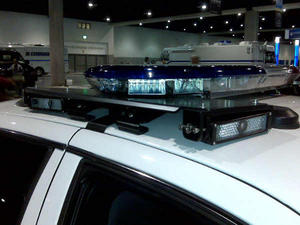Police camera use puts focus on privacy in public
South Portland, Maine, police is using automated license plate recognition CCTV which targets traffic scofflaws — but it is connected to a centralized databank which helps the policy pick up people who are wanted on warrants and other potential offenders; supporters say new license-plate recognition technology will improve the safety

Camera mounted on police cruiser // Source: radiowroks.ca
New surveillance technology being used by South Portland, Maine, police is raising concerns among civil-rights advocates and lawmakers, who say it infringes on individuals’ civil rights. South Portland is apparently Maine’s first community to use automated license plate recognition, which targets traffic scofflaws, people who are wanted on warrants and other potential offenders.
Three cameras were mounted near the blue lights on top of one cruiser, two facing forward, and the third pointing to the passenger side of the car. The cameras take pictures of license plates and run the numbers through the National Crime Information Center’s database.
Portland Press Herald’s Melanie Cremer writesthat state Sen. Dennis Damon (D-Trenton), has introduced a bill to ban technology that is used to gather broad information about private citizens. He said the idea was presented to him by the Maine Civil Liberties Union.
Damon said he is concerned that such technology would let police drive through a parking lot and capture all of the license plates. “All of a sudden they would have reason to believe that I’m in this location – let’s say its a political rally,” Damon said. “Another sweep through a parking area might reveal I am there. Now, all of a sudden there is a track on me. To me, it’s too much of a concern that I might lose my privacy and freedoms that are afforded to me as a citizen of this state and nation.”
South Portland police Lt. Frank Clark said the technology is being used to detect people who are wanted, stolen vehicles or vehicles that have been involved in felonies or violent crimes. Police can also use the system to help find missing people, or when the state issues an Amber Alert, Clark said.
A computer in the cruiser alerts the officer when a vehicle in the database is detected. The officer can then call a dispatcher to verify that the person to whom the vehicle is registered has committed a violation or is wanted for questioning. If that is confirmed, the driver will be stopped.
The technology was installed on Jan. 6. So far, officers have received several hits from the database, none of which has led to enforcement. “Information is gold in this field,” Clark said. “The more information we have and the earlier the officers have it, the safer it will make them. It gives them a quick red flag before they approach the situation.”
David Harrison of
